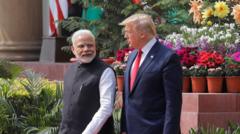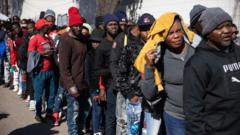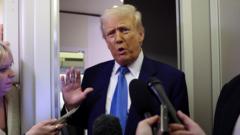The Indian leader's visit comes at a crucial time as both countries navigate complex issues surrounding tariffs and illegal immigration, raising questions about the future of their bilateral relations.
Modi's Upcoming Visit to the US: Trade and Immigration on Agenda

Modi's Upcoming Visit to the US: Trade and Immigration on Agenda
Indian Prime Minister Narendra Modi is set to meet President Trump amid concerns over trade and immigration.
Indian Prime Minister Narendra Modi's upcoming visit to the United States next week marks a significant moment in the ongoing relationship between India and the Trump administration. The White House has confirmed that Modi will meet with President Donald Trump, with plans for a dinner hosted by the US president during the two-day trip, although the exact dates are still to be revealed.
Modi's meeting will place him among the first foreign leaders to engage with Trump in his second term. Current interactions suggest a continuing rapport, as Modi and Trump shared a "productive" phone conversation last week, focusing on critical topics including illegal immigration, security concerns, and trade relations. However, analysts are closely watching to see if their amicable connection can pave the way for tangible solutions to ongoing trade disputes and immigration challenges.
The backdrop to this visit includes Trump's previous characterizations of India as a "tariff king" and a "big abuser" of trade, amid allegations of high tariffs on US goods. Despite these tensions, the Indian government has recently adjusted its budget to lower tariffs on various imports, interpreted as a gesture to mend trade ties. During a recent phone conversation, Trump expressed confidence that India "will do the right thing" concerning illegal immigration, reflecting his administration's focus on addressing undocumented foreign nationals.
Reports indicate that approximately 725,000 undocumented Indian immigrants resided in the US as of last year, although some estimates suggest the actual number could be higher. This issue was brought into sharper focus when around 100 Indian nationals were deported back to India, a situation that underscores the complexity of immigration policies at play.
In the wider context of US-India relations, the visit signifies both a challenge and an opportunity. While concerns regarding tariffs and immigration loom large, India's Foreign Minister, S. Jaishankar, has maintained that the country is open to continuing dialogue and collaboration with the US, emphasizing the importance of strong bilateral relations. As Modi prepares for his visit, the outcomes remain uncertain but will likely impact the trajectory of US-India ties in the coming years.






















